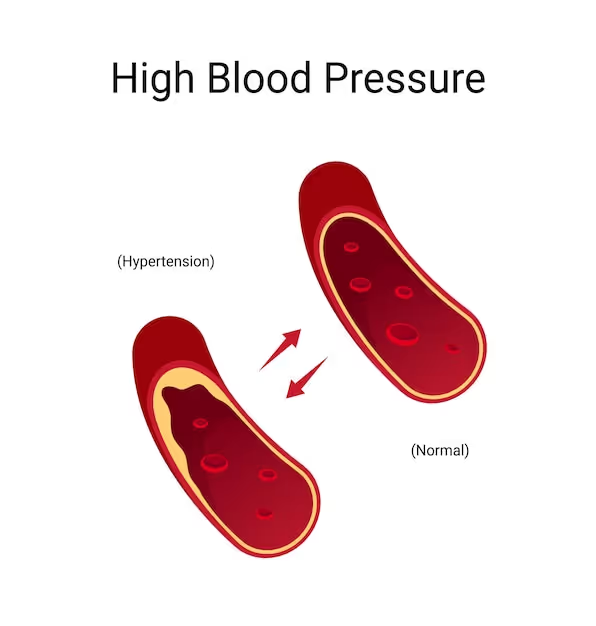Blood Pressure: A Simple Explanation of Its Importance and Levels
Whether you're focused on preventing chronic disease or optimizing your well-being, regularly monitoring and improving blood pressure should be a top priority.

Blood pressure is one of the most critical markers of health, yet many of us don’t fully understand what it means or how to manage it effectively. Whether you’re aiming to prevent chronic disease or simply optimise your health, monitoring and improving blood pressure should be a top priority. Getting your blood pressure checked regularly is essential to prevent serious conditions like hypertension, as many people may not feel symptomatic of high blood pressure.
In this blog, we’ll cover everything you need to know about blood pressure: what it is, how it’s measured, its relationship to overall health, common limitations of relying on blood pressure alone, and actionable tips to keep it in a healthy range.

Blood pressure is the force of blood pushing against the walls of your arteries as your heart pumps. It’s a vital sign of how well your cardiovascular system is functioning.
This pressure is essential for maintaining proper blood flow to organs and tissues, ensuring they receive the oxygen and nutrients they need to function effectively. Blood pressure is measured in millimetres of mercury (mmHg) and is determined by the amount of blood the heart pumps and the resistance to blood flow in the blood vessels. In essence, it reflects how hard your heart has to work to pump blood through your body.
Monitoring blood pressure levels is essential for diagnosing and managing hypertension, as elevated blood pressure can lead to serious health complications if left untreated.
Typically taken using a blood pressure cuff and a stethoscope, this reading is recorded as two numbers: systolic blood pressure and diastolic blood pressure.
Example: A reading of 120/80 mmHg means 120 is the systolic pressure, and 80 is the diastolic pressure.
.avif)
The following are standard blood pressure categories defined by the Australian Heart Foundation:
Blood pressure isn’t static—it fluctuates throughout the day based on activity levels, stress, and other factors. While some variability is normal, excessive swings between high and low readings can indicate underlying health issues, such as autonomic dysfunction or poor cardiovascular regulation.
Tracking blood pressure over time, instead of relying on a single measurement, provides a more accurate picture of overall health. This is why Everlab emphasises continuous tracking and advanced diagnostics (DEXA scan, Whole Body MRI, ECG, CTCA, advanced blood tests) to ensure no important fluctuations in your body are missed.
While high blood pressure is most commonly associated with heart disease, its effects extend to several other critical organs. Persistent hypertension can damage the kidneys, as the increased pressure harms delicate blood vessels and impairs the organ's ability to filter waste. Over time, this can lead to chronic kidney disease.
The brain is also vulnerable. High blood pressure is a leading cause of stroke, as it can weaken or rupture blood vessels. It’s also linked to an increased risk of vascular dementia, where reduced blood flow affects cognitive function.
Hypertension can lead to hypertensive retinopathy, which damages the blood vessels in the retina, potentially resulting in vision loss.
Understanding these risks underscores the importance of managing blood pressure proactively to protect not just the heart but your entire body.
Research consistently links optimal blood pressure to increased lifespan and reduced risk of chronic diseases. By maintaining blood pressure within a healthy range, you can significantly enhance both your quality of life and longevity.
Gender plays a role in how blood pressure is experienced and managed. For instance, women may experience a rise in blood pressure after menopause due to hormonal changes that affect vascular function. On the other hand, men are more likely to develop high blood pressure at younger ages, often linked to lifestyle factors like smoking and alcohol consumption.
Understanding these differences allows for more precise interventions tailored to individual needs.

High blood pressure is a multifaceted condition influenced by a combination of genetic, lifestyle, and environmental factors. Some of the key risk factors include:
Understanding these risk factors can help you take proactive steps to manage your blood pressure and reduce your risk of developing related health issues.
While blood pressure is crucial, it’s not a standalone indicator of overall health.
High or low blood pressure may signal a problem, but it doesn’t explain why the issue exists. Comprehensive testing can uncover root causes.
Factors like stress, physical activity, and even caffeine can cause temporary spikes or drops, making a single reading unreliable.
Blood pressure should be evaluated alongside other metrics, like cholesterol levels and biomarkers, for a complete picture of cardiovascular health.
If your blood pressure is outside the healthy range, the good news is that lifestyle changes can make a significant difference.
Regular monitoring is key. Devices like home blood pressure monitors can provide accurate and consistent readings.
Aim for at least 150 minutes of moderate aerobic activity per week, such as brisk walking, cycling, or swimming.
Chronic stress can elevate blood pressure. Techniques like mindfulness, meditation, or yoga can help you stay calm and reduce stress hormones.
Poor sleep is linked to high blood pressure. Aim for 7–9 hours of restful sleep per night and address conditions like sleep apnoea if necessary.
Both can temporarily spike blood pressure. Moderation is key: stick to the recommended guidelines for safe consumption.
Seeing a healthcare professional ensures you catch potential issues early. Only a doctor or medical professional can confirm a high blood pressure diagnosis, emphasising the importance of professional evaluation. At Everlab, we go beyond blood pressure, offering a comprehensive assessment of over 100 biomarkers to uncover risks and opportunities.
Not everyone responds to sodium intake in the same way, and this is where salt sensitivity comes into play. Some individuals are more prone to significant blood pressure increases with high sodium consumption, while others may experience little to no change.
Genetic factors often determine salt sensitivity, making personalised dietary recommendations crucial. Testing for salt sensitivity, alongside tracking blood pressure, can help individuals tailor their diets for optimal results.
If your blood pressure is consistently elevated or if you experience symptoms like headaches, dizziness, or chest pain, it’s essential to seek medical advice immediately.
Blood pressure management is a cornerstone of preventative health. By detecting risks early and taking action, you can reduce the chances of developing serious conditions down the line.
At Everlab, we integrate blood pressure monitoring into a broader framework that includes cutting-edge diagnostics (DEXA scan, Whole Body MRI, ECG, CTCA, advanced blood tests), personalised plans, and continuous tracking to optimise your health.
Blood pressure is one of many vital indicators of health. Pairing it with biomarker testing, such as cholesterol, inflammation markers like CRP, and metabolic data, provides a comprehensive understanding of your health status. This integrated approach allows for more targeted and effective interventions, reducing your risk of chronic diseases.
Everlab specialises in offering a holistic view of your health by combining blood pressure monitoring with advanced biomarker testing and personalised recommendations.
Blood pressure is a vital health metric, but it’s just one aspect of health. Maintaining it within a healthy range, alongside managing other key indicators, can dramatically reduce disease risk and improve your quality of life.
At Everlab, we help you take control of your health with a proactive, personalised approach. From advanced testing to tailored lifestyle recommendations, we’re here to support your journey to better health and longevity.




Join 1000's of Australians improving their health with proactive, personalised healthcare.